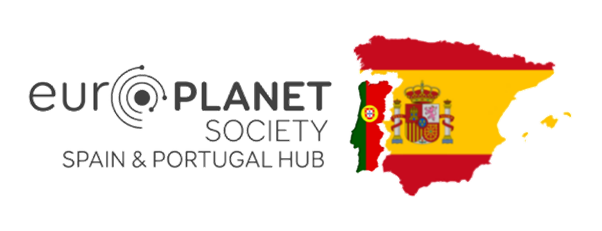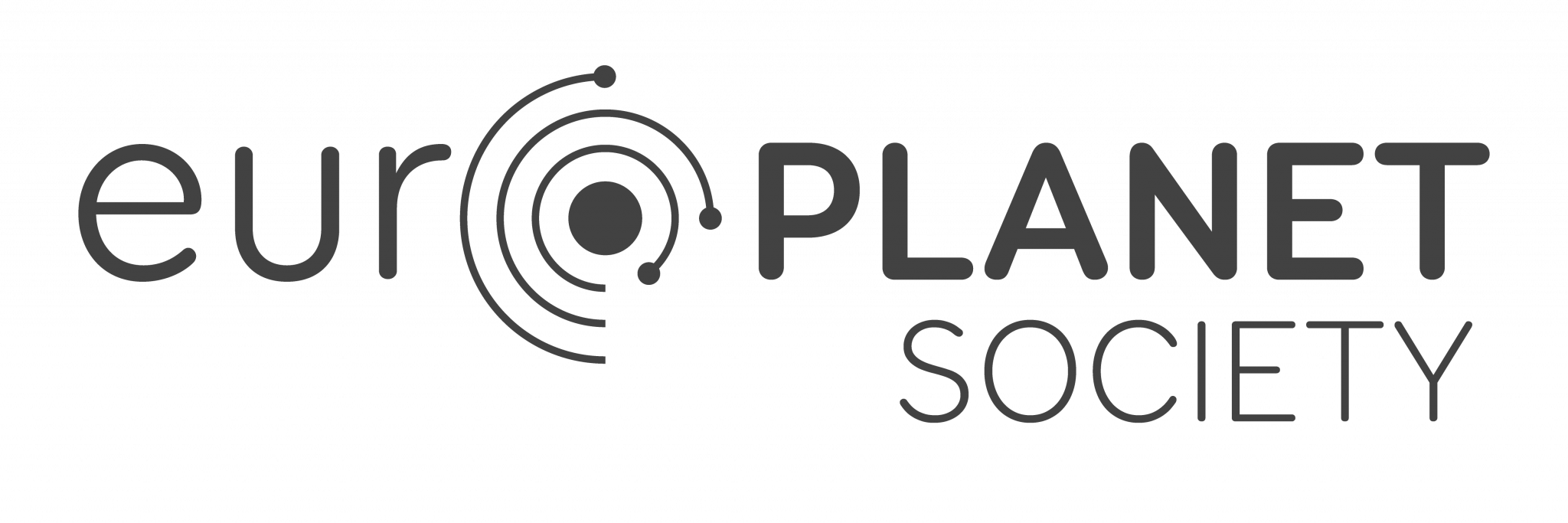Members
Europlanet Society
Amateur
Community
Scientific
Conferences
Space
Exploration
Outreach
Activities
Facilities
Ground Based Telescopes
Industry
& Stakeholders
Networking
Hub Activities
Join
Europlanet Society
Professional
Community
Europlanet Iberian Hub
The Europlanet Spain & Portugal Hub is the Iberian node of the Europlanet Society. Its main objective is to support the Spanish and Portuguese planetary science community, promoting the collaboration between all scientific and technology development institutions and research groups, reinforcing the participation of Iberian scientists and engineers in national and international space research programmes.
Spanish and Portuguese planetary science community
The Iberian Planetary Science Community has over >400 members, planetary researchers and engineers, distributed accross >70 research groups, and >30 institutions.

The Europlanet Society is an international association with the purpose of promoting planetary sciences, solar system exploration and any other related field for the benefit of the planetary science and technology development community, by encouraging the creation of new knowledge, promoting education, stimulating innovation, and enhancing accessibility and transparency. The Society is the parent body of the Europlanet Scientific Congress (EPSC), the largest annual meeting on planetary science in Europe.
The Europlanet Spain & Portugal Hub Coordination Committee is composed by:
- Chair: A. Cardesín Moinelo (ESAC)
- Vice-Chairs: R. Hueso (UPV) / P. Machado (IA-Lisbon)
- Secretary: S. Fernández Menéndez (UniOvi)
- EPS Board Representative: J. De Leon (IAC)
- Representative Spain: P. Benavidez (UA)
- Early Career SP: D. Morate (CEFCA)
- Policy Officer SP: N. Pinilla (UniOvi), I. Pérez Grande & E. Díaz Catalá (AEE)
- Industry Officer SP: A. Catalán (PAE)
- Representative Portugal: P. Machado (IA-Lisbon)
- Early Career PT: J. Dias (IA Lisboa)
- Outreach & Comm. PT: M. Roos (LightCurveFilms)
- Amateur Community : J. Álvaro (FAAE/AstroCuenca)
- Diversity Officer: L. Parro (UA)
- Space Ethics: J. Hdez-Bernal (UPV/LMD)
- Instrumentation & Tech. Dev.: A. Moral-Inza (INTA)
- IberoAmerica: P. Benavides, A. Cardesin, R. Duffard, D. Morate
- Award "Abraham Zacut" for best PhD Thesis on Planetary Sciences & Exploration presented in 2025
- Award "Pedro Nunes" for best Master's Thesis on Planetary Sciences & Exploration presented in 2025
Application form submission by 13 March 2026.
EUROPLANET IBERIAN NODE - PLANETARY THESIS AWARD 2025 - APPLICATION FORM
Science & Technology
- Reunión Científica de la Sociedad Española de Astronomía 2026, Tarragona (ES), del 13 al 17 de julio de 2026
- The Many Pathways to Space, Oviedo, 5-7 Agosto, 2026
- Europlanet Science Congress (EPSC2026), The Hague, The Netherlands, 6–11 September 2026
Pro-Am events
- V Congreso PROAM, Lalín (Galicia), 08-10 de mayo de 2026
- Otros eventos de la Federación Agrupaciones Astronómicas de España
Previous Events
Spanish Planetary Science Community meetings (CPESS)
- CPESS-8 2025 (Málaga)
- CPESS-7 2023 (Valladolid)
- CPESS-6 2019 (Torrejón de Ardoz-Madrid)
- CPESS-5 2017 (Madrid)
- CPESS-4 2015 (Alicante)
- CPESS-3 2013 (Madrid)
- CPESS-2 2011 (Bilbao)
- CPESS-1 2009 (Salobreña)
Sociedad Española de Astronomía Meetings (SEA)
- Reunión Científica SEA 2026 (Tarragona)
- Reunión Científica SEA 2024 (Granada)
- Reunión Científica SEA 2022 (Tenerife)
- Reunión Científica SEA 2020 (virtual)
- Reunión Científica SEA 2018 (Salamanca)
- Reunión Científica SEA 2016 (Bilbao)
- Reunión Científica SEA 2014 (Teruel)
- Reunión Científica SEA 2012 (Valencia)
- Reunión Científica SEA 2010 (Madrid)
- Reunión Científica SEA 2008 (Santander)
- Reunión Científica SEA 2006 (Barcelona)
EUROPLANET IBERIAN AMATEUR ASTRONOMY AWARD
in Solar System Astronomy and Exoplanets
The Europlanet Society, through its Spain & Portugal Regional Hub,will award an individual amateur astronomer or a team of amateurs observing from Spain & Portugal or from Spanish or Portuguese nationalities for their contribution to amateur astronomy in solar system astronomy and exoplanets in the last 3 years (2023-2025).
The prize will use the bases below:
- The prize could be awarded for an individual discovery, a set of relevant observations or with special repercussion in the field of solar system astronomy or exoplanets. The prize could also be awarded for the development of novel instrumentation techniques in the amateur world or for the development of free software wildly used in the amateur community towards analysis of solar system astronomical observations or exoplanet transit analysis. The contribution to be awarded will have to be done in the period from January 2023 to December 2025.
- Participants must be from Spanish or Portuguese nationalities or amateur observers whose contribution has been developed from Spain or Portugal. Participants do not need to be members of the Europlanet Society.
- Areas that are traditionally close to solar system astronomy and exoplanets such as observations of the Sun or stellar variability cannot be considered for the prize.
Applications will be submitted in electronic format (PDF) using the following Application form and must be limited to 2+1 pages. The application will include a presentation of the individual or observing team, a summary of its trajectory in amateur astronomy and a description of the contribution to be evaluated (2 pages). Technical information describing instrumentation or other technical details of the contribution can be included in a 3rd page. Relevant figures can be included in the application.
Language: Applications can be written in Spanish, Portuguese or English.
● Applications must be submitted by 13 March 2026
● The Evaluation Board will be formed by members of the Europlanet Society Spain & Portugal Regional Hub coordination committee, excluding members with possible conflicts of interest. For this prize, the committee will also invite relevant amateur astronomers and professional astronomers working with amateurs and not presenting themselves for this prize.
● The decision taken by the Evaluation Board will be final.
● Exceptionally, the Evaluation Board may decide to award more than one winner for each prize or declare the competition void or cancelled.
● Applications must fulfil all requirements to be considered for evaluation. Any non-veracity in the application would imply disqualification.
● Participation in the award implies implicit authorization for publication of the name of the participant and the summary of the contribution presented.
The Prize will consist of a diploma, a symbolic gift and an official announcement of the Europlanet Society recognizing the value of amateur astronomy for professional astronomers and researchers in space exploration.
Application form






